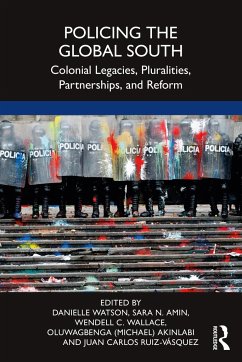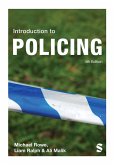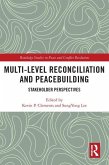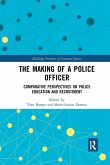Policing the Global South
Colonial Legacies, Pluralities, Partnerships, and Reform
Herausgeber: Watson, Danielle; Wallace, Wendell C.; Amin, Sara N.; Akinlabi, Oluwagbenga (University of New England; Ruiz-Vasquez, Juan Carlos
44,99 €
inkl. MwSt.
Versandkostenfrei*
Liefertermin unbestimmt
Melden Sie sich
hier
hier
für den Produktalarm an, um über die Verfügbarkeit des Produkts informiert zu werden.

22 °P sammeln
Policing the Global South
Colonial Legacies, Pluralities, Partnerships, and Reform
Herausgeber: Watson, Danielle; Wallace, Wendell C.; Amin, Sara N.; Akinlabi, Oluwagbenga (University of New England; Ruiz-Vasquez, Juan Carlos
- Broschiertes Buch
Policing the Global South provides scholarship which further transnationalise and democratise ideas about policing practices and philosophies, highlighting renovations in approaches to policing studies, and injecting innovative perspectives into the study of policing from scholars positioned on the â peripheryâ .
Andere Kunden interessierten sich auch für
![Street Cop Street Cop]() George KleinStreet Cop241,99 €
George KleinStreet Cop241,99 €![Policing Domestic Abuse Policing Domestic Abuse]() Katy Barrow-GrintPolicing Domestic Abuse176,99 €
Katy Barrow-GrintPolicing Domestic Abuse176,99 €![The Ethics of Undercover Policing The Ethics of Undercover Policing]() Christopher NathanThe Ethics of Undercover Policing46,99 €
Christopher NathanThe Ethics of Undercover Policing46,99 €![Introduction to Policing Introduction to Policing]() Michael RoweIntroduction to Policing49,99 €
Michael RoweIntroduction to Policing49,99 €![Multi-Level Reconciliation and Peacebuilding Multi-Level Reconciliation and Peacebuilding]() Multi-Level Reconciliation and Peacebuilding37,99 €
Multi-Level Reconciliation and Peacebuilding37,99 €![Decoy Decoy]() Robert MurphyDecoy11,99 €
Robert MurphyDecoy11,99 €![The Making of a Police Officer The Making of a Police Officer]() The Making of a Police Officer37,99 €
The Making of a Police Officer37,99 €-
-
-
Policing the Global South provides scholarship which further transnationalise and democratise ideas about policing practices and philosophies, highlighting renovations in approaches to policing studies, and injecting innovative perspectives into the study of policing from scholars positioned on the â peripheryâ .
Produktdetails
- Produktdetails
- Verlag: Taylor & Francis Ltd
- Seitenzahl: 394
- Erscheinungstermin: 11. November 2022
- Englisch
- Abmessung: 156mm x 235mm x 24mm
- Gewicht: 634g
- ISBN-13: 9780367648114
- ISBN-10: 0367648113
- Artikelnr.: 64648808
- Verlag: Taylor & Francis Ltd
- Seitenzahl: 394
- Erscheinungstermin: 11. November 2022
- Englisch
- Abmessung: 156mm x 235mm x 24mm
- Gewicht: 634g
- ISBN-13: 9780367648114
- ISBN-10: 0367648113
- Artikelnr.: 64648808
Danielle Watson is Senior Lecturer at Queensland University of Technology, Australia. She conducts research on police-civilian relations on the margins with interests in hotspot policing, police recruitment and training, as well as many other areas specific to policing in developing-country contexts. Sara N. Amin is Senior Lecturer of Sociology at the University of the South Pacific, Fiji. Her research focuses on the areas of migration dynamics, identity politics, gender relations, religion, and education. She is also engaged in the scholarship of transformative pedagogy. Wendell C. Wallace is an English-trained Barrister, Certified Mediator with the Mediation Board of Trinidad and Tobago, and a Criminologist who lectures on the Criminology and Criminal Justice programme at The University of the West Indies, St. Augustine, Trinidad and Tobago. His research interests include policing, gangs, violence (domestic and school) and education-related issues. Oluwagbenga (Michael) Akinlabi is Senior Lecturer in Criminology and Criminal Justice at Northumbria University, UK. He has a PhD in criminology and criminal justice from Griffith University in Australia and an MPhil in criminological research from the University of Cambridge, UK. Michael's research explores police-citizen relations in the Global South. Juan Carlos Ruiz-Vásquez is Professor in the Faculty of International Political and Urban Studies at the Universidad del Rosario in Bogotá, Colombia. His research revolves around citizen security and policing in transitional societies in Latin America. He has served as an instructor on policing the regional training programme funded by the Inter-American Bank of Development.
Introduction
Chapter 1- Policing the Global South-- colonial legacies, pluralities,
partnerships and reform
Part 1 - Acknowledging colonial legacies and their impact on policing
Chapter 2- Bringing empire back in: Unaccountable public violence,
sovereignty and the rule of difference in Latin America
Chapter 3- Post-coloniality as lenses that reveal day-to-day police
practices in Brazil and Mexico
Chapter 4- Modalities of policing in contemporary Brazil
Chapter 5- 'VIP Culture' and the provision of policing and security in
postcolonial Karachi
Chapter 6- From Barefoot Policeman to Policeman as President: An Overview
of the Institutional Development of the Colombian Police Force
Part 2: Navigating plural regulatory systems and policing partnerships
Chapter 7- Serving God, the Community and the State: Policing in Tuvalu
Chapter 8- Police, Private Security, and "Patitos": The Market for Security
in Mexico City
Chapter 9- Plural Policing in Crisis: Inclusive security provision in
violent and unequal societies
Chapter 10- Balancing the scale: Police officers' perspectives on plural
policing in the Solomon Islands
Part 3 - Access to justice, community perceptions and police legitimacy
Chapter 11- Institutional Effectiveness, Access to Justice and the
Governance of Women Police Stations in West Bengal
Chapter 12- Unfulfilled Potential: Women Police Stations in Pakistan
Chapter 13- Proactive or Predatory: Citizen perceptions of the Zimbabwe
state police
Chapter 14- Challenges of Police Prosecution in the Global South:
Perspectives of Ghanaian Police Officers
Chapter 15- An Integrative Assessment of Normative Expectations, Treatment
Outcome, Procedural Justice, and Public Satisfaction with the Police in the
Global South
Part 4 - Organisational reform, crime prevention and community partnerships
Chapter 16- From fear to cooperation: The critical role of community
policing in building trust in the postcolonial state of Pakistan
Chapter 17- Feeling black and blue: indigenous police liaison officers in
Torres Strait region
Chapter 18- 'Police are the public and the public are the police':
Community policing and countering violent extremism (CVE) in Bangladesh
Chapter 19- The Global South and crime prevention through social
development: Evidence from Trinidad and Tobago
Chapter 20- The Effectiveness of the British Models of Community Policing
in Fiji
Chapter 21- From social promise to social fad: The evolution of community
policing on
the Caribbean Island of Dominica
Part 5 - The expanding roles of police organisations
Chapter 22- Policing Human Trafficking and Commercial Sex in Kiribati
Chapter 23- Policing and Technology in the Contemporary Caribbean
Chapter 24- Policing Wildlife Crimes: A historical analysis of the
development and impact of wildlife ranger units in Sub-Saharan Africa
Chapter 25- Criminalization of Moral Hazard during Covid-19 Crisis: The
study of Thailand under emergency decree 2020-2021
Conclusion
Chapter 26- Continuity and change in policing the Global South
Chapter 1- Policing the Global South-- colonial legacies, pluralities,
partnerships and reform
Part 1 - Acknowledging colonial legacies and their impact on policing
Chapter 2- Bringing empire back in: Unaccountable public violence,
sovereignty and the rule of difference in Latin America
Chapter 3- Post-coloniality as lenses that reveal day-to-day police
practices in Brazil and Mexico
Chapter 4- Modalities of policing in contemporary Brazil
Chapter 5- 'VIP Culture' and the provision of policing and security in
postcolonial Karachi
Chapter 6- From Barefoot Policeman to Policeman as President: An Overview
of the Institutional Development of the Colombian Police Force
Part 2: Navigating plural regulatory systems and policing partnerships
Chapter 7- Serving God, the Community and the State: Policing in Tuvalu
Chapter 8- Police, Private Security, and "Patitos": The Market for Security
in Mexico City
Chapter 9- Plural Policing in Crisis: Inclusive security provision in
violent and unequal societies
Chapter 10- Balancing the scale: Police officers' perspectives on plural
policing in the Solomon Islands
Part 3 - Access to justice, community perceptions and police legitimacy
Chapter 11- Institutional Effectiveness, Access to Justice and the
Governance of Women Police Stations in West Bengal
Chapter 12- Unfulfilled Potential: Women Police Stations in Pakistan
Chapter 13- Proactive or Predatory: Citizen perceptions of the Zimbabwe
state police
Chapter 14- Challenges of Police Prosecution in the Global South:
Perspectives of Ghanaian Police Officers
Chapter 15- An Integrative Assessment of Normative Expectations, Treatment
Outcome, Procedural Justice, and Public Satisfaction with the Police in the
Global South
Part 4 - Organisational reform, crime prevention and community partnerships
Chapter 16- From fear to cooperation: The critical role of community
policing in building trust in the postcolonial state of Pakistan
Chapter 17- Feeling black and blue: indigenous police liaison officers in
Torres Strait region
Chapter 18- 'Police are the public and the public are the police':
Community policing and countering violent extremism (CVE) in Bangladesh
Chapter 19- The Global South and crime prevention through social
development: Evidence from Trinidad and Tobago
Chapter 20- The Effectiveness of the British Models of Community Policing
in Fiji
Chapter 21- From social promise to social fad: The evolution of community
policing on
the Caribbean Island of Dominica
Part 5 - The expanding roles of police organisations
Chapter 22- Policing Human Trafficking and Commercial Sex in Kiribati
Chapter 23- Policing and Technology in the Contemporary Caribbean
Chapter 24- Policing Wildlife Crimes: A historical analysis of the
development and impact of wildlife ranger units in Sub-Saharan Africa
Chapter 25- Criminalization of Moral Hazard during Covid-19 Crisis: The
study of Thailand under emergency decree 2020-2021
Conclusion
Chapter 26- Continuity and change in policing the Global South
Introduction
Chapter 1- Policing the Global South-- colonial legacies, pluralities,
partnerships and reform
Part 1 - Acknowledging colonial legacies and their impact on policing
Chapter 2- Bringing empire back in: Unaccountable public violence,
sovereignty and the rule of difference in Latin America
Chapter 3- Post-coloniality as lenses that reveal day-to-day police
practices in Brazil and Mexico
Chapter 4- Modalities of policing in contemporary Brazil
Chapter 5- 'VIP Culture' and the provision of policing and security in
postcolonial Karachi
Chapter 6- From Barefoot Policeman to Policeman as President: An Overview
of the Institutional Development of the Colombian Police Force
Part 2: Navigating plural regulatory systems and policing partnerships
Chapter 7- Serving God, the Community and the State: Policing in Tuvalu
Chapter 8- Police, Private Security, and "Patitos": The Market for Security
in Mexico City
Chapter 9- Plural Policing in Crisis: Inclusive security provision in
violent and unequal societies
Chapter 10- Balancing the scale: Police officers' perspectives on plural
policing in the Solomon Islands
Part 3 - Access to justice, community perceptions and police legitimacy
Chapter 11- Institutional Effectiveness, Access to Justice and the
Governance of Women Police Stations in West Bengal
Chapter 12- Unfulfilled Potential: Women Police Stations in Pakistan
Chapter 13- Proactive or Predatory: Citizen perceptions of the Zimbabwe
state police
Chapter 14- Challenges of Police Prosecution in the Global South:
Perspectives of Ghanaian Police Officers
Chapter 15- An Integrative Assessment of Normative Expectations, Treatment
Outcome, Procedural Justice, and Public Satisfaction with the Police in the
Global South
Part 4 - Organisational reform, crime prevention and community partnerships
Chapter 16- From fear to cooperation: The critical role of community
policing in building trust in the postcolonial state of Pakistan
Chapter 17- Feeling black and blue: indigenous police liaison officers in
Torres Strait region
Chapter 18- 'Police are the public and the public are the police':
Community policing and countering violent extremism (CVE) in Bangladesh
Chapter 19- The Global South and crime prevention through social
development: Evidence from Trinidad and Tobago
Chapter 20- The Effectiveness of the British Models of Community Policing
in Fiji
Chapter 21- From social promise to social fad: The evolution of community
policing on
the Caribbean Island of Dominica
Part 5 - The expanding roles of police organisations
Chapter 22- Policing Human Trafficking and Commercial Sex in Kiribati
Chapter 23- Policing and Technology in the Contemporary Caribbean
Chapter 24- Policing Wildlife Crimes: A historical analysis of the
development and impact of wildlife ranger units in Sub-Saharan Africa
Chapter 25- Criminalization of Moral Hazard during Covid-19 Crisis: The
study of Thailand under emergency decree 2020-2021
Conclusion
Chapter 26- Continuity and change in policing the Global South
Chapter 1- Policing the Global South-- colonial legacies, pluralities,
partnerships and reform
Part 1 - Acknowledging colonial legacies and their impact on policing
Chapter 2- Bringing empire back in: Unaccountable public violence,
sovereignty and the rule of difference in Latin America
Chapter 3- Post-coloniality as lenses that reveal day-to-day police
practices in Brazil and Mexico
Chapter 4- Modalities of policing in contemporary Brazil
Chapter 5- 'VIP Culture' and the provision of policing and security in
postcolonial Karachi
Chapter 6- From Barefoot Policeman to Policeman as President: An Overview
of the Institutional Development of the Colombian Police Force
Part 2: Navigating plural regulatory systems and policing partnerships
Chapter 7- Serving God, the Community and the State: Policing in Tuvalu
Chapter 8- Police, Private Security, and "Patitos": The Market for Security
in Mexico City
Chapter 9- Plural Policing in Crisis: Inclusive security provision in
violent and unequal societies
Chapter 10- Balancing the scale: Police officers' perspectives on plural
policing in the Solomon Islands
Part 3 - Access to justice, community perceptions and police legitimacy
Chapter 11- Institutional Effectiveness, Access to Justice and the
Governance of Women Police Stations in West Bengal
Chapter 12- Unfulfilled Potential: Women Police Stations in Pakistan
Chapter 13- Proactive or Predatory: Citizen perceptions of the Zimbabwe
state police
Chapter 14- Challenges of Police Prosecution in the Global South:
Perspectives of Ghanaian Police Officers
Chapter 15- An Integrative Assessment of Normative Expectations, Treatment
Outcome, Procedural Justice, and Public Satisfaction with the Police in the
Global South
Part 4 - Organisational reform, crime prevention and community partnerships
Chapter 16- From fear to cooperation: The critical role of community
policing in building trust in the postcolonial state of Pakistan
Chapter 17- Feeling black and blue: indigenous police liaison officers in
Torres Strait region
Chapter 18- 'Police are the public and the public are the police':
Community policing and countering violent extremism (CVE) in Bangladesh
Chapter 19- The Global South and crime prevention through social
development: Evidence from Trinidad and Tobago
Chapter 20- The Effectiveness of the British Models of Community Policing
in Fiji
Chapter 21- From social promise to social fad: The evolution of community
policing on
the Caribbean Island of Dominica
Part 5 - The expanding roles of police organisations
Chapter 22- Policing Human Trafficking and Commercial Sex in Kiribati
Chapter 23- Policing and Technology in the Contemporary Caribbean
Chapter 24- Policing Wildlife Crimes: A historical analysis of the
development and impact of wildlife ranger units in Sub-Saharan Africa
Chapter 25- Criminalization of Moral Hazard during Covid-19 Crisis: The
study of Thailand under emergency decree 2020-2021
Conclusion
Chapter 26- Continuity and change in policing the Global South







